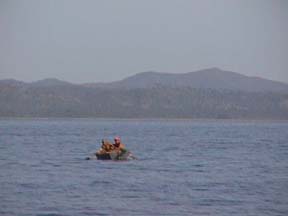
After checking out of The Bahamas at Great Inagua, we stayed at anchor until after dark. We planned an overnight sail to Baracoa, Cuba. It was only abut 60 miles away, so we figured leaving late in the evening after dark would insure us a daylight arrival, making an easier entrance and insuring that officials would be available to check in.
We'd been traveling with another boat, Zelo, a Morgan 41 OI with Tom, Ellen and their two sons aboard. We were making a circle of the Caribbean and heading back to Texas. They were heading for Panama. We planned to travel together as far as Jamaica. About 9 PM Zelo radioed that they were on the way from the little marina and would join us in a few minutes.
We had two anchors out. We'd put a rear anchor out to hold our stern around at an angle to the wind. The waves and wind were coming from different directions around the end of Great Inagua, resulting in us rolling badly at anchor. I had a stern anchor out at one side and pulled Rainbow Chaser around to face the waves instead of the wind. It resulted in the boat being much more comfortable, but required a lot more work to leave.
As we were stowing the last of the ground tackle, Zelo passed us, made a turn to the West and headed for Cuba. Shortly we were following about a mile behind.
We expected it to take about 12 hours, but the wind was good and we made much better time than expected. As it got light, we could see mountain tops on the horizon.
The Bahamas are low, sandy islands with little vegetation. Cuba began rising from the horizon as a green, mountainous landscape. Even though they were only 60 miles apart, there was a world of difference in more than politics. As we got closer we started seeing small boats in the water. We had no idea what sort of attitude to expect from the Cuban people. After all, our government would have us believe we were heading into a land of the enemy.
As we came close to the first fishing boat with two middle aged Cuban men aboard, we saw they were waving at us. They had huge smiles on their faces and seemed genuinely glad to see up. We waved back and relaxed a bit.

As we approached the harbor entrance, we saw more small boats. All of the boats were small wooden boats that appeared to be homemade. They were about 18 feet long, flat bottom and had sunshades that appeared to be made of pipe with some canvas over them. They all could have been made from the same plan, and each had a small inboard motor. Once we heard a couple of them running, we realized they closely resembled old lawnmower motors with bad rings, belching smoke most of the time.
Rainbow Chaser entered first with Zelo a quarter mile behind. We had no idea what to expect, but we found a harbor of about 10 or 15 acres in size. A finger of land with apartment type buildings stuck out to enclose the harbor and on the left was a sunken freighter of some sort that had been there for many years. About half of it was out of the water. On past the freighter were some docks and what appeared to be a couple of small warehouses. There were nearly no people moving about in the town, and only 2 cars to be seen anywhere.
We had no idea where we should anchor, so we slowed down and started looking for the best place.
There was a middle aged man in a very dilapidated woodenrowboat farther in the harbor waving to us. At first we figured he was just a local fisherman or scavenger who was saying hello to us, but he seemed very insistent on getting our attention. For a bit we weren't sure if he was just waving or trying to tell us where to anchor. Soon it became apparent we wanted us come on into the harbor where he was. Looking at the boat, I wasn't sure he wasn't a local derelict who was just out for a row. He was waving with one hand and dipping water out of the old boat with a can in the other.
As I got closer, I could tell he was asking us something about a visa, but visa was the only word I could understand. I didn't have any idea if he was asking if we had one or if we needed one. And he couldn't understand our answers, either. After cruising in English speaking islands for months, it was a bit frustrating.
I did understand where he wanted us to anchor, and since nobody else was around or was attempting to meet us, we dropped the hook. Zelo anchored about 200 feet behind us. Looking around, we still saw no activity, except a few men on boats similar to the ones we saw offshore, and they just smiled, waved and went back to whatever they were doing.
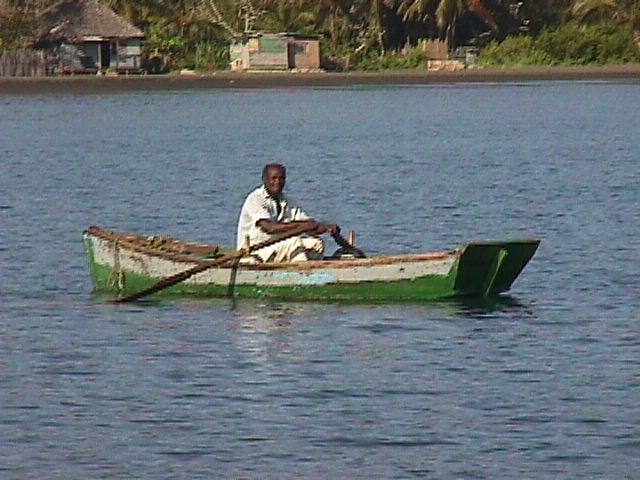
The fellow in the old boat slowly rowed to shore, swinging his homemade, patched oars and dipping water with his can every few strokes. After going ashore for a few minutes, he headed back with another fellow. As they came alongside, the original fellow, who we later learned was Eduardo, steadied the boat while the new guy introduced himself as the Doctor in fair English, asked if he could come aboard. We said certainly and he started taking off his shoes. I let him know that wasn't necessary and motioned for him to come on aboard.
Once he was in the cockpit he explained in his broken English that he needed to ask us some questions, would we mind? Of course, this is standard practice in any port, except we weren't usually asked if it was ok. He was attempting to stand and write on a battered clipboard, and with a bit of boat motion it was difficult. Nellie suggested he take a seat. He said "Thank you", took a seat, and we realized we had aboard the most courteous official that had ever been on our boat.
He went down a mental list, writing on a blank paper - I suppose Castro ran out of forms - the answers to "Does anyone on board have a fever"? "Did anyone die on the passage"? While he was asking me questions Nellie got him a cold Cola from the refrigerator. As he savored the cold drink, he apologized and explained that he would have to take our garbage from us. Now, cruisers are always buried in garbage. It's hard to get rid of, and sometimes expensive. For someone to insist that they take it with them is quite a nice event. Nellie hurried to make sure we didn't miss giving him any.
Once we were blessed by the Doctor, Eduardo stopped dipping water for a couple minutes and rowed back beside us to pick up the Doctor, who climbed into the rowboat with an armload of garbage. They then paddled over to Zelo to go through the same routine.
Once Zelo had their blank form filled out and garbage removed, the two rowed back to the docks. Soon Eduardo was paddling back with two more guys. One looked like he was ready to hit a party, dressed in a flower covered shirt in Caribbean colors. The other looked like he came straight from a military function, dressed in starched fatigues. As Eduardo held the old rowboat steady next to Rainbow Chaser, both men started untying their shoes.
I motioned to them that it was ok, just come on aboard. In a minute we had two new visitors. These fellows spoke only a few words of English, and we spoke less Spanish. It took a few minutes to communicate anything. After a bit of trying to communicate, we learned that the party guy was the customs agent and the military fellow was the Port Captain.
Nellie had prepared a Zarpa , which is a clearance document with all the boat and crew information, in Spanish, using instructions and a sample from a cruising guide. In addition to the boat's details, we were each listed, along with our position on the boat. I was listed as Capitan, Nellie as First Mate, Zach as Navigator, and Ninja, our cat, was listed as Cato, (Spanish For cat) the "Ships Mouser". We presented it to them and it got our processing started.
All was going well as they digested all of it, but in a minute I could see eyes looking at the paper, then counting us. They both did this several times and conferred between them selves a few times in low voices. Then the Port Captain turned to us and counted in Spanish as he pointed to each of us. He\rquote d get to 3, then look for a fourth person and point to the Zarpa. He asked in sign language where the fourth person was? What had happened to Mr. Cato? Nellie grinned and ducked below, reappearing with Ninja in her arms. She held her out and said "Cato"!
Both Cubans at once said "Ah! Cato!" with big grins on their faces. They started petting and grinning and you'd think neither had seen a cat before. In reality, it might have been some time since they had, since we saw no cats or dogs on shore. They were just fascinated by Ninja, petting her, talking to her, wanting to hold her. Ninja, on the other hand, didn't want anything to do with the whole deal and escaped as soon as she saw her chance.
Once we got past the missing "Mr. Cato", The Port Captain continued filling out his forms - which started again as blank tablet paper. While he was writing, Nellie got my attention and whispering to me, asked if I'd noticed the insignia on the Port Captain's uniforms? They were all done with Magic Markers! Later, we figured that Castro had run out of money and couldn't afford real patches.
As we finished the paperwork, the Port Captain was explaining that we wouldn't be able to get a visa there. Even though the cruise guide said it was a port of entry, things had changed since it was printed and there was no longer an immigration officer there. We would have to go to another port 100 miles away to get a visa if we wanted to go into Cuba. It took quite a bit of sign language and notes on our cruising guide around the print date to communicate this. However, when I asked if it would be alright for us to visit their little town and walk around for the day, I knew they understood what I was asking by the instant terror in their eyes and their immediate response of "NO! NO! NO!" with hands up and palms out. I could just see it - they were imagining Castro getting a call that there were tourists loose in their town on their watch with no visas, and they were headed to the chopping block! It was real plain that we weren't going ashore. We could, however, stay in the anchorage for a day or two.
There was another strange thing going on, also. We noticed that often, as the Port Captain and customs guy were talking, they would hesitate and would look out at Eduardo. Eduardo would give a nod or shake his head and things would resume. We had to wonder just who was in charge of what.
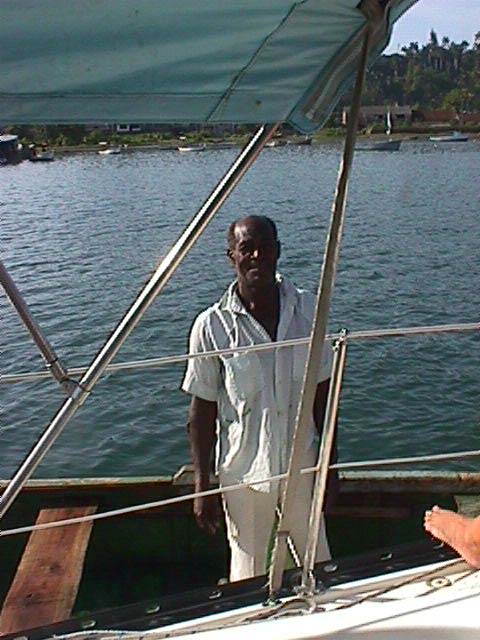
Nellie got some cold colas from the refrigerator and offered them each one. They calmed down and were quite happy to accept. They then asked permission to go below and have a look. As they got below, they w ere very impressed to see the inside of the boat. I'm sure the accommodations were quite a bit better than they had at home.
They noticed the CD player we have exposed in a side locker and asked what it was. Nellie pressed the start button, and Garth Brooks started blaring out at them. They looked at each other again with big grins, then turned to Nellie and asked "Americano?" "Si", Nellie replied. I guess the radio waves don't carry the latest music to them. As they listened, they started doing a little dance, hands with American cola up in the air, dancing and jiving to Garth Brooks with the biggest grins you ever saw. We were having a regular party with two Cubans dancing to Garth Brooks in the cabin of our boat!
After a song or two, they realized they needed to go check in Zelo, so they went on deck where Eduardo was waiting and dipping water. They said goodbye, climbed into the rowboat and Eduardo rowed them over to the other boat. We'd never had an official on our boat who showed us as much respect and politeness as these people.
Later, we talked to Tom and Ellen and found they had an interesting experience as well. They went through the same paperwork, and learned about the visa problem as we had. They had another thing to worry about, though, as they carry a couple of guns aboard.
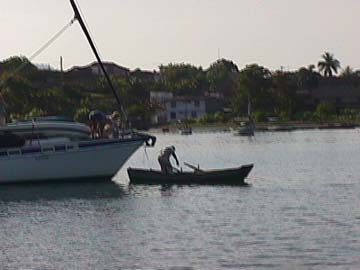
Once the paperwork was out of the way, the Cubans wanted to play with the guns. The one that they really liked was a little derringer that would fit in the palm of your hand. One of them would slip it up his sleeve, then let it drop in his palm, point it at something and go "Bang"! Then the other would put it in his sock, draw it out, point it at something and go "Bang"! They told us the two officers played with it for a long time, giggling, grinning and having a ball. Eventually, they had to go. They left the guns aboard Zelo, climbed into the old rowboat with Eduardo, then rowed back to the dock.
Although we weren't allowed to go ashore, we were allowed to go back and forth between the two boats, so we got together and visited, comparing notes about our experience. After about 2 hours, The Port Captain was rowed back to Zelo by Eduardo.
He apologized profusely, but said he had to take the guns and ammunition ashore. They would be kept in their safe, then returned just before we left. There is no way to know for sure, but my guess is the Port Captain made his report to superiors and the guns were in his report. They chewed him out and told him to get the guns NOW. He treated them like they were extremely fragile, wrapping them in towels and carrying them like they were eggs. Off they rowed, Eduardo manning the oars and dipping water from the rowboat.
It was about noon when the guns were rowed to shore and we spent there rest of the day relaxing, watching the limited activity on shore and planning supper. There were a dozen or more of the little inboard boats in the harbor, and every once in a while someone would start one up and motor around the harbor for no apparent reason. Some ran pretty good, some made a lot of noise and left a big cloud of smoke behind them. All of them smiled ear to ear and waved as they went near us. We never saw any type of automobile move: no car, truck or motor scooter. We also never saw any animal walking on shore.
Although most buildings needed a coat of paint, everything was well kept and neat. There were no falling down porches, no trash, and things looked quite well cared for. They seemed to take a lot of pride in the little they had.
We planned to leave in the morning as long as the weather was ok. Listening to the forecasts on the single side band late in the evening, it sounded like it would be just fine to go. A little before dark, Eduardo rowed out to see if we needed anything and we let him know that we planned to leave early in the morning.
In the morning Zelo's guns were returned. The Port Captain didn't come himself, but sent his underlings, a 16 year old boy who was dressed just like him, wearing starched fatigues with magic marker insignia. He was accompanied by the Port Captain's secretary. Again, the guns could have been eggs or explosives the way they handled them.
Once the guns were back, we got out gifts of tee shirts, toiletries, and other stuff we could spare. After snapping a few pictures, we prepared to leave. With Eduardo steadying the boat and dipping, he, the secretary and Port Captain Jr. waited for us to leave. It was plain that if the guns were on board, we were going to be watched closely until we were gone.
Since we'd planned to leave, both boats were ready except for hoisting the anchors. It didn't take long and we were underway, heading for the opening to the sea. As we left, each person in a boat waved and smiled, people on the shore were watching and waving. We were certainly sad that we weren't getting to take extended trips ashore.
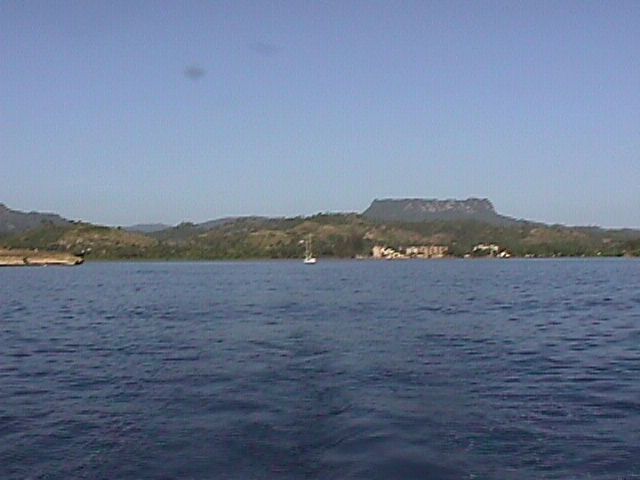
Our next destination was Port Antonio, Jamaica, a place we'd spent time at before. Getting there would require going through the Windward Passage between Cuba and Haiti. This can be a very terrible passage when the weather kicks up, but we'd made sure the weather report said it was going to be calm. That left only one worry - boarding by the US Coast Guard! This is an area they patrol heavily at times and we weren't looking forward to being boarded. We had a plan to avoid it as long as possible, though. We'd just stay in Cuban Waters until we were on the south side of the island.
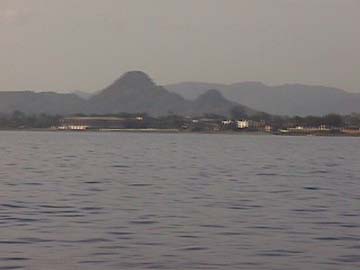
As we made our way along the coast, in addition to avoiding being boarded, we had very pretty scenery. The East end of Cuba is very mountainous and very pretty. As we passed creeks opening to the ocean, we looked up valleys that were awesome. Along the way, we passed several of the small Cuban fishing boats bobbing around out in the ocean. We had to wonder what happened when one was caught out there when a storm came up.
Being miles out in an 18 foot boat with low freeboard is not something I would like to try, but they seemed very content. Each smiled and waved as we passed.
By mid afternoon we had passed through the Windward Passage and were on the South side of Cuba. It was time to leave Cuban waters. We had a straight shot of about 180 miles to Port Antonio. We had a good weather window and no expected problems ahead, except possibly a hassle by our own country. Goodbye Cuba, Hello Jamaica!